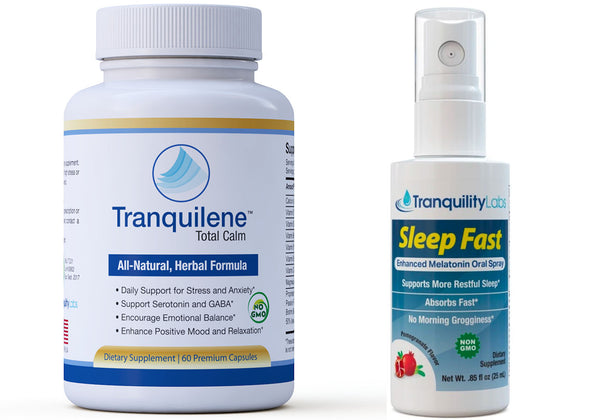Anxiety can be exhausting, mentally...and physically. Battling anxiety can keep you all night. Not to mention, daytime anxiety drains energy levels dry. Let's discuss why you feel tired when you have an anxiety disorder. Plus, we'll share some tips to say good night to your fight or flight instincts!
Why Does Anxiety Make Me Feel Sleepy?
Physical symptoms of anxiety can be described as restlessness, fidgetiness, and high alertness. All of these symptoms don't sound like anything that would make us feel tired. In fact, they all sound rather stimulating.
However, these physical symptoms of anxiety drain energy mentally. During an anxiety attack, your body isn't in a state of rest.
You're dealing with muscle tension, shortness of breath, and other bodily movements. These physical actions wear on your mental resources, which can result in chronic fatigue or brain fog.
Mental symptoms of anxiety can also promote sleepiness. Chronic anxiety activates our fight or flight instinct. Being alert at all times can be taxing to your mental state, which can make you feel tired. Although, your body still won't rest.
These instincts are regulated by our hormones, namely cortisol. When we endure chronic anxiety, our cortisol levels never have the opportunity to level off. As a result, they end up commandeering all of your hormonal pathways, which can make it challenging for your body to produce its sleep hormone, melatonin.
Melatonin is produced in the pineal gland from serotonin, our joy molecule. Unfortunately, many people who have mental health issues have trouble producing adequate serotonin. That's those with depression and anxiety tend to have difficulty falling asleep at night.
Lastly, sleep problems can be frustrating. Knowing that you're entering a sleepless night can result in a panic attack as bedtime looms near. A mere yawn can become a trigger. As a result, some people will feel anxiety when tired.
How to Improve Anxiety and Sleep At Night
The body runs on a 24-hour cycle known as circadian rhythm. This biological clock is dictated by night and day. So, you must tend to both cycles to get your anxiety and sleep patterns in sync. When you make progress with one, by default, you make progress with the other. Let us explain.
Get Better Sleep
Perhaps the easiest place to start making progress is by getting better sleep. Calming yourself down when you're feeling anxious can require multiple interventions. You have to deal with those particular stressors. Fighting sleep problems ends with the same results -- falling asleep.
Since this goal is easier to define, the problem becomes easier to solve. We need to calm our state of mind and boost melatonin production.
One of the most efficient ways to achieve this goal is with Tranquility Labs' Sleep-Fast Enhanced Melatonin Spray. This non-habit-forming sleep-aid contains botanicals that calm the mind, such as chamomile flower and Valerian root, and lemon balm. These herbs help soothe the body, which naturally lowers your fight or flight instinct.
Naturally, cortisol levels start to taper off, making room for natural melatonin production. This process gets expedited by the formula's melatonin. Fast-absorbing melatonin will help kickstart your sleep. In addition, calming herbs will keep your cortisol in check so that your natural melatonin levels can keep you asleep through the night.
Manage Anxiety Triggers
With better sleep, you will manage daytime stress with a clearer head. As you notice stress emerging, find ways to handle it.
Gain control of your heart rate by trying some deep breathing techniques. Perhaps you should leave the situation by taking a walk outside? Get additional information about the benefits of the sun and fresh air for anxiety here.
You can also set yourself up for success by starting your day with Tranquility Labs' Tranquilene Total Calm. This all-natural supplement is fortified with herbs, vitamins, and minerals that promote GABA and serotonin production.
GABA is our inhibitory hormone. It helps calm the increased heart rate we experience during anxiety, or that might keep us up at night.
Meanwhile, serotonin is a molecule that promotes contentment. Adequate levels will help you maintain concentration during the day and confidence in your abilities. Excess serotonin at night gets converted into melatonin, which will help support healthy sleep patterns.
What to Do About Anxiety and Sleep Issues
If you experience continuous anxiety and sleep problems, please seek professional help. You might have underlying conditions, such as adrenal fatigue, depression, or sleep apnea.
In the meantime, you can make minor changes to your routine that are conducive to managing stress and sleep.
Stay hydrated throughout the day and get plenty of exercise. Eat balanced meals, refraining from too many sweets and packaged foods. Lastly, enhance your wellness with all-natural supplements. Save money with Tranquility Labs' Sleep and Anxiety Management Pack.
This wellness bundle has everything you need to tend to your daytime anxiety and nighttime sleep problems. It's the perfect companion to getting your circadian rhythm back on track. With better sleep, you will have a more productive and fulfilling day!
Essential Takeaways:
- Sleep and anxiety and intertwined, tending to one will help the other
- Anxiety increases the cortisol hormone, which disrupts our sleep hormone, melatonin
- Getting adequate sleep can naturally lower cortisol levels
BONUS RECIPE: Kiwi Wraps or Rolls
INGREDIENTS
- 1 whole wheat tortilla
- 1 tablespoon peanut butter
- 1 tablespoon cream cheese
- ½ kiwi, peeled and thinly sliced
- Cut rounded edges from tortilla to form a square. Spread peanut butter on one half of the tortilla; spread cream cheese on remaining half.
- Place kiwi slices in a single layer over cream cheese. Starting with the cream cheese end, gently roll up the tortilla to form a log shape. Serve as a wrap or sliced into thick rounds.









